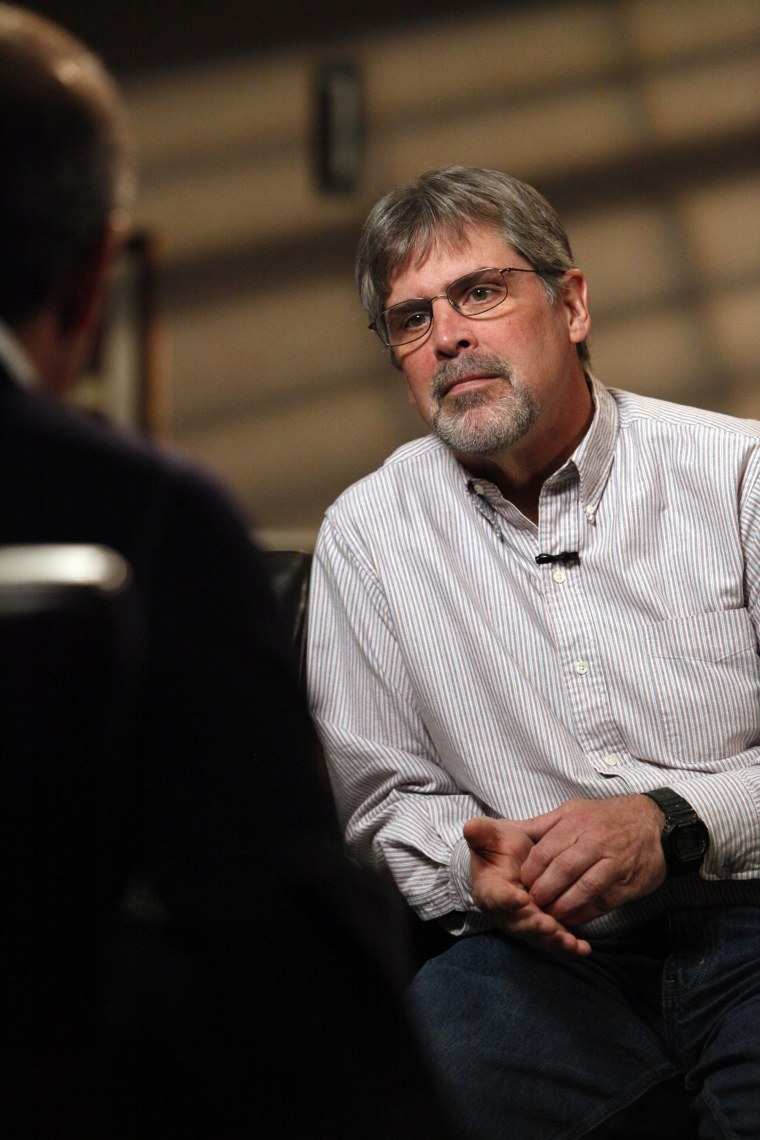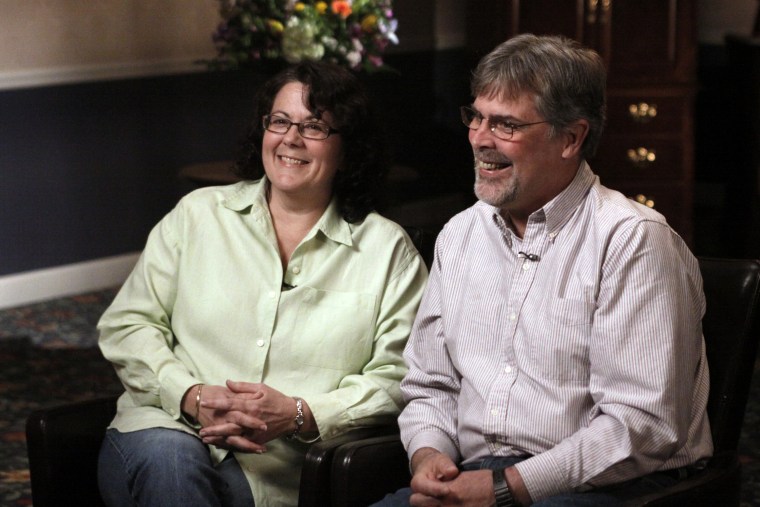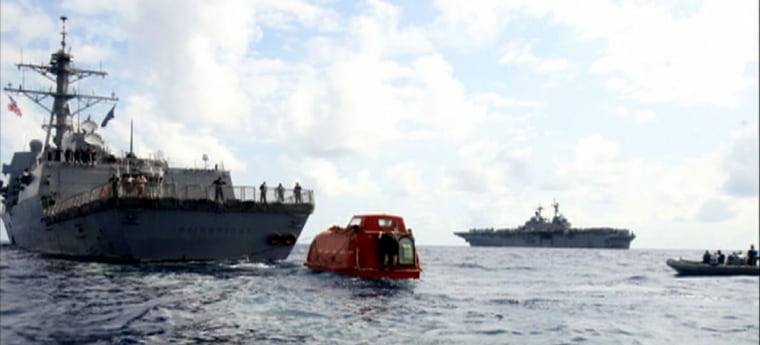In an exclusive interview with Matt Lauer — the first Capt. Richard Phillips has given since being freed on Easter Sunday by Navy SEALs — the merchant mariner gave a dramatic first-person account of his ordeal under the guns of Somali pirates, his daring escape attempt and his “impossible” rescue.
“It’s still surreal,” Phillips said. “I didn’t think I'd ever get out of that boat.”
Also interviewed was Phillips’ wife, Andrea, who said that even though she knew that her husband was probably bound and held at gunpoint, she always believed he would come out of the ordeal alive. “I never really gave up the fact that I felt very strongly that Richard was going to be OK,” she said.
The interview with Richard and Andrea Phillips was conducted last week at their home in Vermont and was broadcast Tuesday morning on TODAY.
‘It was scary’
Phillips’ cargo ship, the Maersk Alabama, was boarded by four pirates on the night of April 8, but thanks to the decisive actions of him and his crew, the pirates were never able to take control of the ship. Phillips declined to go into too much detail about how he and his 19-man crew outwitted the pirates, citing security issues, but he did tell Lauer that he had been expecting to be targeted by the pirates on one of his many voyages past the Horn of Africa.
“I’d been in that area since 2004 — Persian Gulf, Red Sea, northwestern Indian Ocean. The danger’s always been there,” Phillips told Lauer. “I was expecting something to happen at some point.” It wasn’t a matter of if but of when, he said.
In fact, in the last e-mail he sent his wife, two days before the pirates attacked, Phillips chatted about the mundane subjects of the weather and his crew and asked the standard questions about how their two college-age kids were doing. He ended with the line: “Pirates are getting restless.”
Phillips told Lauer it wasn’t a premonition, just the reality of what he’d been seeing on the news.
In the crosshairsThe 53-year-old captain told Lauer his crew spotted the pirate vessel on radar at a range of about 3.5 miles around 6:45 a.m. Wednesday, April 8. “It was just a small boat, a 20-foot boat,” Phillips said.
At the start of every voyage, Phillips said, he and the crew went over their procedures for dealing with pirate attacks. As the small boat drew closer, they knew they were the target. Merchant ships have traditionally been unarmed, and the crews are civilian mariners. But they do have defensive measures. One is using fire hoses to attempt to repel boarders. Phillips said he could not go into detail on the others.
“Fire hoses were used, I wouldn’t want to go into how we used them. Obviously they weren’t a good enough deterrent,” Phillips said.
The pirates boarded quickly once they drew alongside. “They basically put up a ladder — a very nice ladder; climbed up the ship very agile,” Phillips told Lauer.
The crew were as ready as they could be. “By the time they were a mile away, we had done our procedures and sounded our signals,” Phillips said, adding that that included making a distress call. “The crew was doing what they were supposed to do. The ship was locked down at all times anyway, except for one door. And even that door is guarded by a key door. I don’t want to go into all the things we do again, because I don’t want to alert the pirates for a future incident.”
Part of the procedure was to shut the ship down in such a way that even Phillips couldn’t start it again. Phillips credited his chief mate, Shane Murphy, with taking quick action that prevented the pirates from ever taking control of the ship.
Chaos, then standoff
The situation on the 500-foot vessel was somewhat chaotic. Phillips said the pirates fired guns and the crew managed to capture one of their attackers, stabbing him in the hand in the process.
“Was there a lot of gunfire?” Lauer asked.
“I wouldn’t say a lot. I wouldn’t say a little,” Phillips replied. “I don’t know what a lot is. I’m a merchant mariner, I’m not a military person.”
Phillips’ hope was that with the ship disabled, the pirates would give up and leave, but the boat they used in their attack had capsized while they were climbing aboard the Maersk Alabama. He suggested the ship’s special survival lifeboat, an enclosed boat.
Phillips admitted to Lauer that his attempt to trade the pirate prisoner for himself was ill-advised and unsuccessful. It only resulted in all four pirates being together on the lifeboat with Phillips. The pirates spoke sufficient English to allow communication.
After that, the situation settled into a five-day standoff, punctuated by Phillips’ escape attempt on his third day of captivity.
Phillips told Lauer he had a radio in the lifeboat, and the pirates let him communicate with his crew on the Maersk Alabama. He told the crew that he would try to escape if he could.
“At the beginning, I did have radio contact with the Maersk Alabama, and I told them, ‘If you see a splash in the water, it’s going to be ’cause I’m coming.’ I had always expected to escape.”

The escape attempt
Phillips made his attempted escape — “underline ‘attempted,’ ” he said ruefully — two days later, jumping out of the lifeboat while three of his guards were sleeping and one at the ship’s hatchway had put his AK-47 down to urinate. As the man was relieving himself, Phillips pushed him aside and dove, trying to swim as far away as he could underwater and hoping they wouldn’t see him when he came up.
He got about 50 feet from the boat before the pirates started shooting at him and he gave up his escape attempt.
“I would imagine, Rich, that the mood on that lifeboat changed substantially after that escape attempt,” Lauer said dryly.
“I was in deep trouble from day one,” Phillips said, but he agreed that after the attempt, “the atmosphere, the body language, yes, things changed from that point on. Yes, they did.”
“They keep a gun on you more often?” Lauer asked.
“There was always a gun on me,” he said.

Feeling certain the standoff would end with his death, Phillips thought about his family.
“Were those comforting thoughts or were those painful thoughts?” Lauer asked.
“It was just settling everything,” Phillips said. “Getting ready to die and just settling everything. You know, saying my last thoughts: Andrea, the kids.”
“Just knowing that the conditions and his living space and the guns and ... I’m assuming tied — that was hard for me to keep strong, because I had two children ... And it was scary,” Andrea Phillips said.
But she never wavered in her belief that her 53-year-old husband would make it. “It's kind of funny to say, but I never really gave up the fact that I felt very strongly that Richard was going to be OK,” she explained. “There were like a lot of little quirky signs that were happening at home, and just feelings that I could just sense that Richard is going to be OK. I just kind of had that faith in that inner feeling.”
Phillips said he passed his time during his captivity thinking and fighting the oppressive heat inside the lifeboat.
“Within hours of once I was on there, my shirt was off, I was basically in pants and socks for the rest of the time. I really just wanted to jump in that water to get cool,” Phillips said. “It was very, very hot on the lifeboat. Very, very hot. You’re just soaked in sweat. You’re dirty. It was strange because when the sun came up, I sort of dreaded the sun. And you look forward to the sun going down because you get a little cooling in there.”
Lauer asked whether he had sufficient food.
“I really wasn’t hungry with that heat,” Phillips said. “There was food there, obviously in the lifeboat. They mainly ate that. I wasn’t eating that.”
There was fresh water on the boat, but sanitary facilities were minimal.
“So, it got nasty on that boat,” Lauer observed.
“It wasn’t pleasant. We were in a small area. So, yeah, it wasn’t the most comfortable. It wasn’t the Queen Mary,” Phillips replied.
“How did you keep your nerves in check? How did you keep your sanity?” Lauer asked.
Phillips laughed, as he did frequently during the long interview. “I’m Irish, I’m stubborn,” he said. “Even they said — they called me a pain and I’m trouble. And I said, ‘Yes I am.’ So, it was an ongoing will there. And I wasn’t giving up. I knew they weren’t.”
The rescue
On Easter Sunday, April 12, Phillips heard gunshots in the lifeboat. He had no idea that the Navy destroyer, the USS Bainbridge, that had moved in to shadow the lifeboat had launched a rescue operation authorized by President Barack Obama.
Phillips had no advanced warning of the rescue and didn’t even know what was happening until it was over. At the time of the rescue, one pirate — who is now in the United States facing criminal charges — was on the Bainbridge negotiating a ransom while three remained on the lifeboat, one holding an AK-47 to Phillips’ back. The captain’s hands were free and his feet were loosely bound.
Fearing that Phillips’ life was in imminent danger, the captain of the Bainbridge authorized three Navy SEALs on the ship’s fantail to take out the three pirates. They performed their job flawlessly.
“I didn’t know what happened,” Phillips said. “I can tell you what I thought happened. But I didn’t think it had anything to do with military … I thought it was a disagreement.”
“Between the pirates?” Lauer asked.
“Yeah,” Phillips replied. It was only when he heard an American voice calling to him after the pirates were shot and killed that he realized he’d been saved.
The rescue was over in seconds, he said, although it didn’t feel like that in the hot and reeking lifeboat in which he had spent five days at gunpoint.
“For me it felt like five minutes. It was probably seven, eight seconds. I have no idea. Time was fractured for me. So it felt very long for me. It probably indeed wasn’t,” Phillips said.“I didn’t think I’d ever get out of that boat.”
‘They did the impossible’Phillips said the whole scene was hard to comprehend, even after he realized his captors were dead and he was saved.
“Was that just a moment of pure elation?” Lauer asked.

“No. It’s still surreal,” Phillips replied. “I was in elation and I was in limbo, away from the lifeboat [and] coming up next to the Navy ship with some military people in the boat. I was still trying to get over what happened.”
Phillips credited the SEAL sharpshooters with saving his life.
“What I said when I came home is true. These SEALs and the Navy did an impossible job,” the captain told Lauer. “They're unbelievable people. We really owe it to the military for what they do day in and day out that we never even hear about.”
Phillips, who finally returned home on Friday, April 17, emphasized the enormous difficulty of the task the sharpshooters accomplished: “What they did was impossible. And they did the impossible. And they do it day in, day out. They’re titans. They’re superheroes.”
And Capt. Phillips, said his wife, “is a tough guy.”
With his trademark good humor, the hero captain corrected her: “I’m a lucky guy.”